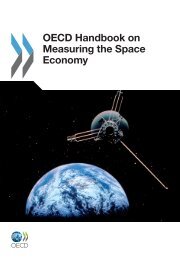Evaluating Country Programmes - OECD Online Bookshop
Evaluating Country Programmes - OECD Online Bookshop
Evaluating Country Programmes - OECD Online Bookshop
Create successful ePaper yourself
Turn your PDF publications into a flip-book with our unique Google optimized e-Paper software.
<strong>Evaluating</strong> <strong>Country</strong> <strong>Programmes</strong><br />
198<br />
Most of these criteria are to be found in the BMZ guidelines for the country concepts,<br />
i.e. they are nothing new. What is important, however, is that they should not<br />
be understood as a list of points that are left to the discretion of those who prepare<br />
a country concept; they must instead be grasped as essential elements of a strategy<br />
that is required for any engagement in a priority area and must be conceived in<br />
such a way as to ensure that the contribution made by German development cooperation<br />
is structure-building and sustainable.<br />
Preparing meaningful priority area strategies can go beyond the scope of the<br />
country concepts which are normally very condensed documents. This is especially<br />
true for priority areas that are highly complex (as regards the goals to be achieved,<br />
the framework conditions or actors involved, the levels of intervention, or the mix<br />
of instruments). As a consequence, the BMZ recently started to prepare priority<br />
area strategies as separate papers that are attached to the country concepts; the<br />
former are included in the country concepts themselves only in the form of summaries.<br />
Preparing priority area strategy papers no doubt calls for additional effort, but<br />
this can substantially facilitate the monitoring task of the BMZ’s regional divisions.<br />
Once a country concept has been prepared for the first time, or an existing one<br />
has been updated, the corresponding country programme (the existing project<br />
portfolio) should be reviewed and, if necessary, adjusted. It is very rare that the<br />
country concepts of/for the development co-operation with a partner country are<br />
drawn up from scratch. Hence, the fact that priority areas must be selected and a<br />
“future-oriented” strategy formulated for them does not mean that the development<br />
co-operation already underway is abandoned in favour of an entirely new<br />
start. However, it does imply scrutiny (in agreement with the partner) and, if need<br />
be, adjustment of ongoing projects on the basis of the priority area strategies formulated<br />
in the country concept. This is particularly true when, at the moment of<br />
working out a new country concept, an incoherent assortment of individual projects<br />
coexist which have to be transformed, step by step, into a coherent priority area<br />
strategy. Here, it can prove necessary to reorient, or indeed terminate, individual<br />
projects and to conceive new ones.<br />
<strong>Country</strong> concepts and the monitoring and strategic controlling responsibility<br />
of the BMZ<br />
While the guidelines set out by the BMZ specify the management function of<br />
the country concepts in different respects, by and large they do not spell out the<br />
function of the country concept as an instrument of strategic control, even though<br />
this function is an essential component of management, a sine qua non if the goals<br />
formulated in a country concept for development co-operation with a partner country<br />
are to be achieved. It is simply not enough to select priority areas, no matter how<br />
well-grounded they may be, to formulate a strategy for them, and to gear a<br />
<strong>OECD</strong> 1999

















![CQE=U]^\]Z: KAZAKHSTAN - OECD Online Bookshop](https://img.yumpu.com/3915768/1/190x253/cqeuz-kazakhstan-oecd-online-bookshop.jpg?quality=85)